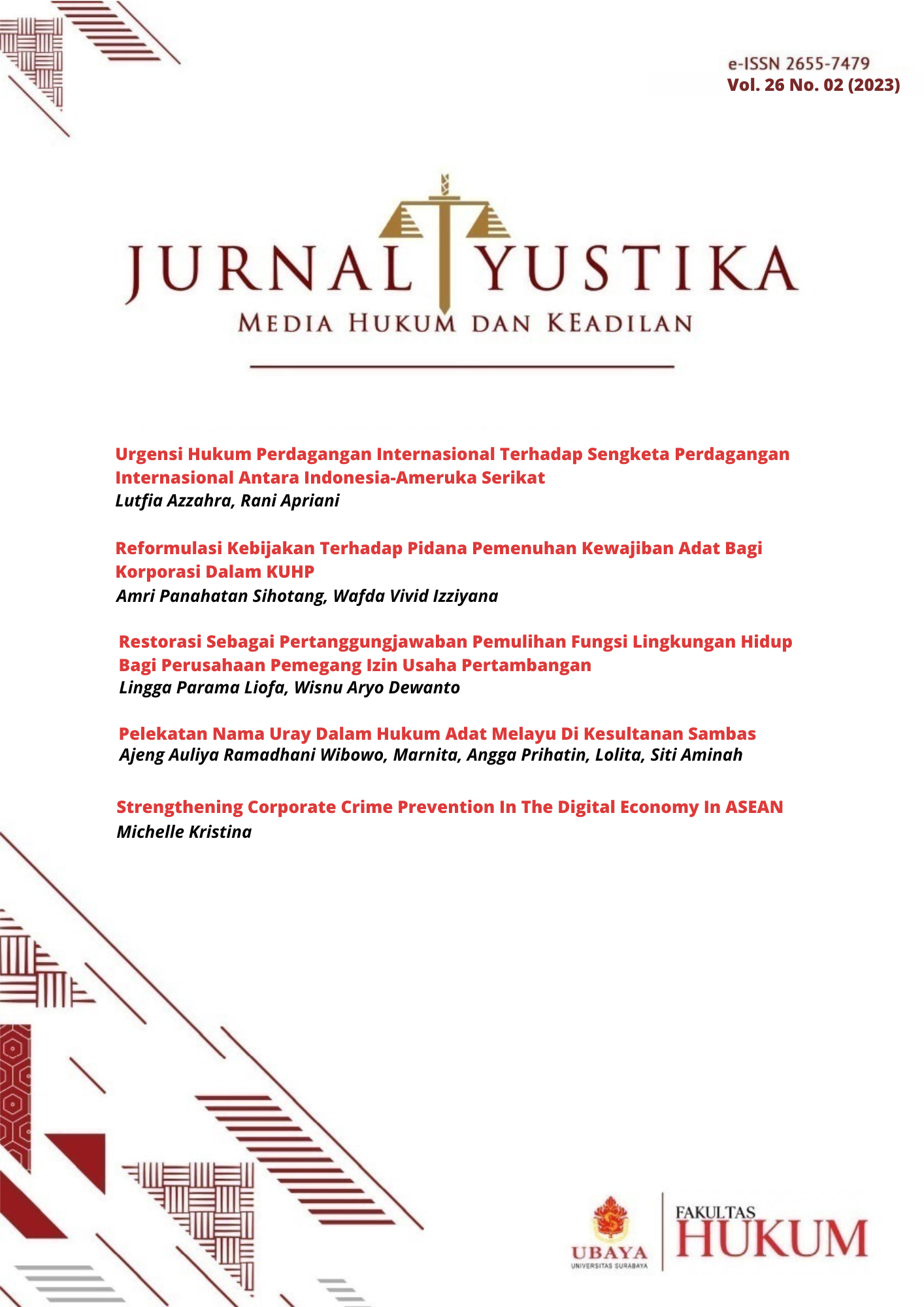Reformulasi Kebijakan Terhadap Pidana Pemenuhan Kewajiban Adat Bagi Korporasi Dalam KUHP
 Abstract Views:
413 times
Abstract Views:
413 times
 PDF Downloads:
551 times
PDF Downloads:
551 times
Abstract
Crime by corporations is increasingly diverse along with the Times. Corporate crime has a more massive
impact than conventional crime. New provisions in the Criminal Code related to corporations, namely
corporations, have been made the subject of criminal law. It also regulates the main crime for corporations,
namely fines, various types of additional crimes, one of which is the fulfillment of customary obligations.
The problems in this study are related to the additional criminal formulation policy in the form of fulfillment
of local customs obligations for corporations in the Criminal Code and the ideal formulation policy related
to the additional criminal form of fulfillment of local customs obligations for corporations in the Criminal
Code. This study uses the method of normative analysis of research results to explain the policy formulation
given in the draft law is part of the criminal law policy or criminal law politics. The additional criminal
formulation policy in the form of fulfilling local customary obligations for corporations in the criminal code
is to realize legislation that can be used by law enforcement in handling cases involving corporations in
accordance with the provisions of Article 45 paragraph (1) of the Criminal Code and in imposing additional
crimes judges can see the provisions of Article 120 of the Criminal Code. The ideal formulation policy
relating to additional crimes in the form of fulfilling customary obligations for corporations must formulate
the criminal fulfillment of customary obligations that apply to subjects of corporate law as well as the
provisions of Article 120 Paragraph (1) of the Criminal Code. In-depth research on Indigenous peoples
must be carried out and must respect the decisions of the indigenous judiciary.
Downloads
References
Bosko, A. R. (2023). Penjatuhan Sanksi Adat, Efek Jera, Dan Reaksi Masyarakat Terhadap Tindak Pidana Pencurian Yang Diselesaikan Dengan Menggunakan Hukum Adat Di Desa Tapenpah, Kecamatan Insana, Kabupaten Timor Tengah Utara. Jurnal Hukum Online, 1(3), 493-514. https://jurnalhukumonline.com/index.php/JHO/article/view/103
Disemadi, H. S., & Jaya, N. S. P. (2019). Perkembangan Pengaturan Korporasi Sebagai Subjek Hukum Pidana Di Indonesia. Jurnal Hukum Media Bhakti. https://journal.fhupb.ac.id/index.php/jhmb/article/view/38
Ekaputra, M., & Kahir, A. (2010). Sistem Pidana di dalam KUHP dan pengaturannya menurut Konsep KUHP Baru. USU press. https://books.google.com/books?hl=id&lr=&id=hGYe4O3_PksC&oi=fnd&pg=PR3&dq=kuhp+baru&ots=fz9EPM1kuX&sig=jGsMJasoxOzT9h4q4B8IZZA9R8Q
Ishwara, A. S. S. (2023). Reformasi Hukum Pidana: Suatu Kajian Yuridis Terhadap Pembuktian Tindak Pidana Santet Dalam Kuhp Baru. Iblam Law Review, 3(3), 100-111. https://ejurnal.iblam.ac.id/IRL/index.php/ILR/article/view/191
Krismen, Y. (2014). Pertanggungjawaban Pidana Korporasi Dalam Kejahatan Ekonomi. Jurnal Ilmu Hukum, 5(1), 61-70. https://jih.ejournal.unri.ac.id/index.php/JIH/article/view/2089
Kurniawan, I. (2012). Perkembangan Tindak Pidana Pencucian Uang (Money Laundering) dan Dampaknya Terhadap Sektor Ekonomi dan Bisnis. Jurnal Ilmu Hukum, 4(1). https://jih.ejournal.unri.ac.id/index.php/JIH/article/view/1037
Kusyandi, A., & Salsabila, S. (2023). KEDUDUKAN HUKUM PIDANA ADAT DALAM HUKUM PIDANA INDONESIA. Yustitia, 9(2). https://www.yustitia.unwir.ac.id/index.php/yustitia/article/view/205
Nurchaesar, D., & Arafat, M. R. (2021). Perbandingan Sistem Hukum Pidana Di Indonesia: Pidana Barat (KUHP) Dan Pidana Adat. JUSTITIA: Jurnal Ilmu Hukum Dan Humaniora, 8, 852-63. https://www.academia.edu/download/99781156/pdf.pdf
Oktaviani, I. O., & Agusmidah, A. (2023). PEMBAHARUAN HUKUM DAN RASA KEADILAN MASYARAKAT YANG RELIGIUS: PENGATURAN TINDAK PIDANA ZINA DALAM KUHP TERBARU. Law Jurnal, 3(2), 183-193. http://jurnal.dharmawangsa.ac.id/index.php/law_jurnal/article/download/3104/2148
Sambas, N. (2009). Eksistensi Hukum Pidana Adat Dalam Pembentukan Hukum Pidana Nasional. Syiar Hukum, 11(3), 233-244. https://www.neliti.com/publications/25234/eksistensi-hukum-pidana-adat-dalam-pembentukan-hukum-pidana-nasional
Satria, H. (2016). Pertanggungjawaban pidana korporasi dalam tindak pidana sumber daya alam. Mimbar Hukum-Fakultas Hukum Universitas Gadjah Mada, 28(2), 288-300. https://journal.ugm.ac.id/jmh/article/view/16722
Sidabutar, A. P., Balqis, T. L., Gaol, L. L., Isnaniah, I., Taufik, T. A., Nababan, R., & Ibrahim, M. (2024). Kritik Terhadap Perubahan RUU KUHP: Perspektif Hukum Pidana dan Hak Warga Negara. ALADALAH: Jurnal Politik, Sosial, Hukum dan Humaniora, 2(1), 99-105. https://ejurnalqarnain.stisnq.ac.id/index.php/ALADALAH/article/view/625
Yoserwan, Y. (2023). EKSISTENSI HUKUM PIDANA ADAT DALAM HUKUM PIDANA NASIONAL SETELAH PENGESAHAN KUHP BARU. UNES Law Review, 5(4), 1999-2013. https://www.review-unes.com/index.php/law/article/view/577
Zain, M. A. (2023). Peran Desa Adat Dalam Merumuskan Dan Mengimplementasikan Ketentuan Pidana Berasal Dari Hukum Yang Hidup Dalam Masyarakat Sebagaimana Diatur Dalam Kuhp Baru. Jurnal Rechts Vinding: Media Pembinaan Hukum Nasional, 12(1). https://rechtsvinding.bphn.go.id/ejournal/index.php/jrv/article/view/1101

This work is licensed under a Creative Commons Attribution-ShareAlike 4.0 International License.
All articles published in YUSTIKA are licensed under a Creative Commons Attribution-ShareAlike 4.0 International (CC BY-SA) license. This means anyone is free to copy, transform, or redistribute articles for any lawful purpose in any medium, provided they give appropriate attribution to the original author(s) and YUSTIKA, link to the license, indicate if changes were made, and redistribute any derivative work under the same license.
Copyright on articles is retained by the respective author(s), without restrictions. A non-exclusive license is granted to YUSTIKA to publish the article and identify itself as its original publisher, along with the commercial right to include the article in a hardcopy issue for sale to libraries and individuals.
Although the conditions of the CC BY-SA license don't apply to authors (as the copyright holder of your article, you have no restrictions on your rights), by submitting to YUSTIKA, authors recognize the rights of readers, and must grant any third party the right to use their article to the extent provided by the license.

 DOI:
DOI:




.jpg)




